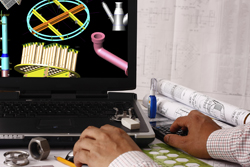On-demand production of spare parts
The number and variety of products available on the market are continuously increasing. At the same time, the lifetime of products is continuously decreasing as a result of rapid innovation and decreased time-to-market. As a result, companies are required to keep warehouses full of spare parts for potential needs that may never arise. Such stock results in high costs, extensive scrap material and complex logistics management. Rapid manufacturing (RM) technology, as its name implies, is a process that enable fast manufacture of often-complex parts. It has proved quite beneficial for production of prototypes and of small lots of novel products with particular importance for small and medium-sized enterprises (SMEs). RM enables cost-effective manufacture of one-off parts on demand. Its obvious advantages as an alternative to warehouses full of (potentially useless) spare parts are the inspiration behind the EC-funded DirectSpare project. Scientists integrated computer-aided engineering (CAE) techniques with a unique set of design rules for a truly knowledge-based system (KBS). Process automation was included where ever possible and new rapid design tools were developed. DirectSpare investigators developed standardisation of processes in manufacturing, logistics product and process certification and business management. The system also required creation of the information and communications technology (ICT) required to catalogue all parts. In addition, scientists developed a total quality management (TQM) system and software tools for CAE and RM input data as well as for process control and final product quality. All project objectives have been achieved and successfully demonstrated through application to selected case studies in several industries. In addition, a selection tool was developed to assess the suitability of a given part to RM processes and future research activities and business opportunities have been identified. DirectSpare processes and tools should have important impact on reducing warehouse stock, capital depreciation, energy consumption related to warehouse management and materials waste as spare parts become obsolete. Resulting cost savings combined with rapid replacement of necessary parts will boost European competitiveness and be of particular benefit to SMEs.



